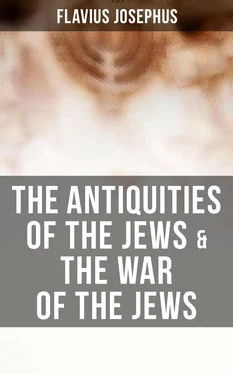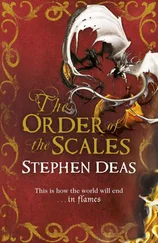2From this Jubal, not improbably, came Jobel, the trumpet of jobel or jubilee; that large and loud musical instrument, used in proclaiming the liberty at the year of jubilee.
3The number of Adam's children, as says the old tradition was thirty-three sons, and twenty-three daughters.
4What is here said of Seth and his posterity, that they were very good and virtuous, and at the same time very happy, without any considerable misfortunes, for seven generations, (see ch. 2. sect. 1, before; and ch. 3. sect. 1, hereafter,) is exactly agreeable to the state of the world and the conduct of Providence in all the first ages.
5Of Josephus's mistake here, when he took Seth the son of Adam, for Seth or Sesostris, king of Egypt, the erector of this pillar in the land of Siriad, see Essay on the Old Testament, Appendix, p. 159, 160. Although the main of this relation might be true, and Adam might foretell a conflagration and a deluge, which all antiquity witnesses to be an ancient tradition; nay, Seth's posterity might engrave their inventions in astronomy on two such pillars; yet it is no way credible that they could survive the deluge, which has buried all such pillars and edifices far under ground in the sediment of its waters, especially since the like pillars of the Egyptian Seth or Sesostris were extant after the flood, in the land of Siriad, and perhaps in the days of Josephus also, as is shown in the place here referred to.
CHAPTER 3
Concerning The Flood; And After What Manner Noah Was Saved In An Ark, With His Kindred, And Afterwards Dwelt In The Plain Of Shinar
Table of Contents
1. Now this posterity of Seth continued to esteem God as the Lord of the universe, and to have an entire regard to virtue, for seven generations; but in process of time they were perverted, and forsook the practices of their forefathers; and did neither pay those honors to God which were appointed them, nor had they any concern to do justice towards men. But for what degree of zeal they had formerly shown for virtue, they now showed by their actions a double degree of wickedness, whereby they made God to be their enemy. For many angels 1of God accompanied with women, and begat sons that proved unjust, and despisers of all that was good, on account of the confidence they had in their own strength; for the tradition is, that these men did what resembled the acts of those whom the Grecians call giants. But Noah was very uneasy at what they did; and being displeased at their conduct, persuaded them to change their dispositions and their acts for the better: but seeing they did not yield to him, but were slaves to their wicked pleasures, he was afraid they would kill him, together with his wife and children, and those they had married; so he departed out of that land.
2. Now God loved this man for his righteousness: yet he not only condemned those other men for their wickedness, but determined to destroy the whole race of mankind, and to make another race that should be pure from wickedness; and cutting short their lives, and making their years not so many as they formerly lived, but one hundred and twenty only, 2he turned the dry land into sea; and thus were all these men destroyed: but Noah alone was saved; for God suggested to him the following contrivance and way of escape: — That he should make an ark of four stories high, three hundred cubits 3long, fifty cubits broad, and thirty cubits high. Accordingly he entered into that ark, and his wife, and sons, and their wives, and put into it not only other provisions, to support their wants there, but also sent in with the rest all sorts of living creatures, the male and his female, for the preservation of their kinds; and others of them by sevens. Now this ark had firm walls, and a roof, and was braced with cross beams, so that it could not be any way drowned or overborne by the violence of the water. And thus was Noah, with his family, preserved. Now he was the tenth from Adam, as being the son of Lamech, whose father was Mathusela; he was the son of Enoch, the son of Jared; and Jared was the son of Malaleel, who, with many of his sisters, were the children of Cainan, the son of Enos. Now Enos was the son of Seth, the son of Adam.
3. This calamity happened in the six hundredth year of Noah's government, (age,) in the second month, 4called by the Macedonians Dius, but by the Hebrews Marchesuan: for so did they order their year in Egypt. But Moses appointed that ú Nisan, which is the same with Xanthicus, should be the first month for their festivals, because he brought them out of Egypt in that month: so that this month began the year as to all the solemnities they observed to the honor of God, although he preserved the original order of the months as to selling and buying, and other ordinary affairs. Now he says that this flood began on the twenty-seventh (seventeenth) day of the forementioned month; and this was two thousand six hundred and fifty-six (one thousand six hundred and fifty-six) years from Adam, the first man; and the time is written down in our sacred books, those who then lived having noted down, 5with great accuracy, both the births and deaths of illustrious men.
4. For indeed Seth was born when Adam was in his two hundred and thirtieth year, who lived nine hundred and thirty years. Seth begat Enos in his two hundred and fifth year; who, when he had lived nine hundred and twelve years, delivered the government to Cainan his son, whom he had in his hundred and ninetieth year. He lived nine hundred and five years. Cainan, when he had lived nine hundred and ten years, had his son Malaleel, who was born in his hundred and seventieth year. This Malaleel, having lived eight hundred and ninety-five years, died, leaving his son Jared, whom he begat when he was in his hundred and sixty-fifth year. He lived nine hundred and sixty-two years; and then his son Enoch succeeded him, who was born when his father was one hundred and sixty-two years old. Now he, when he had lived three hundred and sixty-five years, departed and went to God; whence it is that they have not written down his death. Now Mathusela, the son of Enoch, who was born to him when he was one hundred and sixty-five years old, had Lamech for his son when he was one hundred and eighty-seven years of age; to whom he delivered the government, when he had retained it nine hundred and sixty-nine years. Now Lamech, when he had governed seven hundred and seventy-seven years, appointed Noah, his son, to be ruler of the people, who was born to Lamech when he was one hundred and eighty-two years old, and retained the government nine hundred and fifty years. These years collected together make up the sum before set down. But let no one inquire into the deaths of these men; for they extended their lives along together with their children and grandchildren; but let him have regard to their births only.
5. When God gave the signal, and it began to rain, the water poured down forty entire days, till it became fifteen cubits higher than the earth; which was the reason why there was no greater number preserved, since they had no place to fly to. When the rain ceased, the water did but just begin to abate after one hundred and fifty days, (that is, on the seventeenth day of the seventh month,) it then ceasing to subside for a little while. After this, the ark rested on the top of a certain mountain in Armenia; which, when Noah understood, he opened it; and seeing a small piece of land about it, he continued quiet, and conceived some cheerful hopes of deliverance. But a few days afterward, when the water was decreased to a greater degree, he sent out a raven, as desirous to learn whether any other part of the earth were left dry by the water, and whether he might go out of the ark with safety; but the raven, finding all the land still overflowed, returned to Noah again. And after seven days he sent out a dove, to know the state of the ground; which came back to him covered with mud, and bringing an olive branch: hereby Noah learned that the earth was become clear of the flood. So after he had staid seven more days, he sent the living creatures out of the ark; and both he and his family went out, when he also sacrificed to God, and feasted with his companions. However, the Armenians call this place, αποβατηριον 6The Place of Descent; for the ark being saved in that place, its remains are shown there by the inhabitants to this day.
Читать дальше












